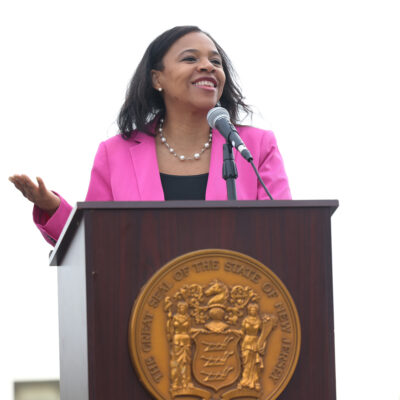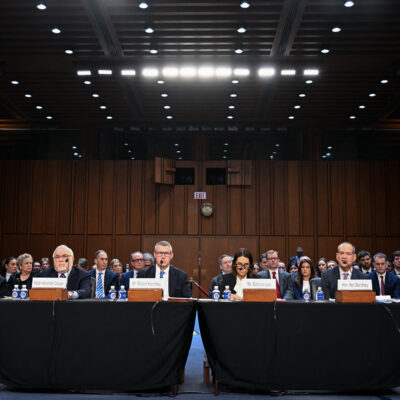
Henry Nicholls - WPA Pool/Getty Images
U.K.’s new Labour government takes harder stance on Israel’s war against Hamas
Philip Rosenberg, president of the Board of Deputies of British Jews, told JI that many of the government’s decisions were expected but there is still some disappointment that these steps were taken against Israel so soon
Less than a month after taking power in a landslide election, the new Labour government in the United Kingdom has made clear statements – and taken some concrete steps – suggesting it is taking a more unforgiving stance towards Israel, particularly in the ongoing war against Hamas in Gaza.
From calling for an immediate cease-fire to resuming funding for the controversial U.N. Relief and Works Agency to dropping objections to the International Criminal Court’s (ICC) jurisdiction over Israel, as well as reportedly considering a suspension of arms sales to Israel, the new government is pivoting away from the more pro-Israel position of the previous U.K. government – and it has some Jews in the U.K concerned.
Philip Rosenberg, the newly elected president of the Board of Deputies of British Jews, told Jewish Insider that all these steps needed to be put in context, however, and that “a lot of the things they are doing, they did say they would do.”
“I think there was a clear sense that many of these things would be done further down the road,” he said. “I just think they have come sooner than we expected and despite knowing that they might have been coming, we are disappointed that they have come.”
Rosenberg, who last week met for the first time with U.K. government officials, including the new prime minister, Keir Starmer, told JI that while “some challenges remain on the horizon, we are making good progress on a number of fronts.”
“The government has been pretty consistent from the beginning in calling for an immediate cease-fire, but it has also said it wants to see the immediate release of the hostages,” he noted. “I think that is important as well, and that part of the messaging is coming out fairly strongly as well, so the two things are absolutely tied together.”
“We do have work to do on the international front,” Rosenberg, who was elected in May, said. “And we’ll continue to do it.”
Alex Hearn, co-director of Labour Against Antisemitism, also said “the speed and extent of proposed changes has been surprising” and that the new trajectory of British government policy towards Israel is “concerning.”
“Claiming they support Israel’s right to self-defense rings hollow when significant actions demonstrate the opposite,” he said, adding that “It is now unclear whether the U.K. government can be relied upon to support this close ally in anything more than words of reassurance should attacks from Iran and its proxies worsen.”
Rosenberg, however, said there were some positive signs.
“The point that we’ve been making to the government – and remember, this is still a new government and it’s still getting a handle on things – is that we must back Israel’s security and its right to defend itself,” he explained.

“Israel is a key ally and it would be extraordinary for the U.K. to not continue backing it, particularly in light of Israel having experienced the worst attack on Jewish life on a single day since the Holocaust,” Rosenberg added, referring to Hamas’ Oct. 7 attacks.
Since coming to power last month, the new government has affirmed its support by sending two senior ministers to Israel, one in the last week as it contends with increasing threats from across the region – particularly following the assassinations of Hamas’ top political leader, Ismail Haniyeh, in Tehran and Hezbollah’s military chief, Fuad Shukr, in the heart of Beirut.
On Friday, U.K. Secretary of State for Defense John Healey met with his Israeli counterpart, Defense Minister Yoav Gallant, in Tel Aviv. The two emphasized the “important defense ties between Israel and Britain,” according to a readout of the meeting.
Healey, who also traveled to Ramallah to meet Palestinian Authority leaders during his visit, which was part of a wider regional tour together with U.K. Foreign Secretary David Lammy, said that “de-escalation must be the first focus in the Middle East.”
Like Lammy, who came to Israel just nine days after being appointed, Healey stressed the “need for an immediate cease-fire in Gaza, the release of all hostages and to get more aid to Palestinians.”
Healey – and Lammy’s – visits to the region last week come as tensions in the region have risen following the double assassinations, with direct threats issued against Israel on Thursday by Iranian Supreme Leader Ali Khamenei and by Hassan Nasrallah, head of the militant Shiite group, Hezbollah, which sits on Israel’s northern border and which just over a week ago killed 12 children in a rocket attack on the Israeli town of Majdal Shams on the Golan Heights.

Prior to the horrific attack in Majdal Shams – and following Lammy’s visit to Israel on July 14 – there was discussion that the U.K. government was planning to suspend arms exports to Israel. The U.K.’s Times reported, however, that such a step would not come quickly as there was a need to determine which weapons deliveries, if any, would be paused.
Lammy, who has boasted of his close ties with the U.K. Jewish community and is a longtime member of the parliamentary advocacy group Labour Friends of Israel, did, however, announce that the U.K. would resume its funding for UNRWA, after the previous government halted its support for the agency amid Israeli allegations that some employees were actively involved in the Oct. 7 atrocities.
Britain’s decision to restore its funding for UNRWA – even as Israeli lawmakers work to outlaw the organization from operating within its territory – followed similar decisions by other countries including Japan, Germany, Italy, Australia and Canada. The U.S. has halted funding to UNRWA through next spring, and legislators are mulling extending the freeze.
“I’m pleased that in response to both the horrific attack by Hezbollah against Majdal Shams and in response to requests from the community, the government will now delay the decision on arms sales for the time being,” said Rosenberg, referring to the discussions on suspending arms sales to Israel.
“That does not mean we’re out of the woods, but it does mean they’ve had a pause and they’re going to think further about the issue,” he continued, adding that statements issued last week by the U.K. foreign office and comments in the U.N. Security Council by Britain’s Permanent Representative to the U.N. following the Majdal Shams attack showed a slight “change in tone.”
“I think it’s important to see the balance of the context of those things,” Rosenberg pointed out. “Some of the decisions that have come thick and fast were not at the time of the government’s own choosing, such as the ICC decision, and on the domestic front, there have been some positive steps.”






